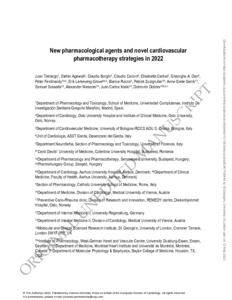Tamargo, J;
Agewall, S;
Borghi, C;
Ceconi, C;
Cerbai, E;
Dan, GA;
Ferdinandy, P;
Grove, EL;
Rocca, B;
Sulzgruber, P;
et al.
Tamargo, J; Agewall, S; Borghi, C; Ceconi, C; Cerbai, E; Dan, GA; Ferdinandy, P; Grove, EL; Rocca, B; Sulzgruber, P; Semb, AG; Sossalla, S; Niessner, A; Kaski, JC; Dobrev, D
(2023)
New pharmacological agents and novel cardiovascular pharmacotherapy strategies in 2022.
Eur Heart J Cardiovasc Pharmacother, 9 (4).
pp. 353-370.
ISSN 2055-6845
https://doi.org/10.1093/ehjcvp/pvad034
SGUL Authors: Kaski, Juan Carlos
![[img]](https://openaccess.sgul.ac.uk/115411/1.hassmallThumbnailVersion/pvad034.pdf)  Preview |
|
PDF
Published Version
Available under License ["licenses_description_publisher" not defined].
Download (2MB)
| Preview
|
Abstract
Cardiovascular diseases (CVD) remain the leading cause of death worldwide and pharmacotherapy of most of them is suboptimal. Thus, there is a clear unmet clinical need to develop new pharmacological strategies with greater efficacy and better safety profiles. In this review, we summarize the most relevant advances in cardiovascular pharmacology in 2022 including the approval of first-in-class drugs that open new avenues for the treatment of obstructive hypertrophic cardiomyopathy (mavacamten), type 2 diabetes mellitus (tirzepatide), and heart failure (HF) independent of left ventricular ejection fraction (sodium-glucose cotransporter 2 inhibitors). We also dealt with fixed dose combination therapies repurposing different formulations of "old" drugs with well-known efficacy and safety for the treatment of patients with acute decompensated HF (acetazolamide plus loop diuretics), atherosclerotic cardiovascular disease (moderate-dose statin plus ezetimibe), Marfan syndrome (angiotensin receptor blockers plus β-blockers), and secondary cardiovascular prevention (i.e. low-dose aspirin, ramipril and atorvastatin), thereby filling existing gaps in knowledge, and opening new avenues for the treatment of CVD. Clinical trials confirming the role of dapagliflozin in patients with HF and mildly reduced or preserved ejection fraction, long-term evolocumab to reduce the risk of cardiovascular events, vitamin K antagonists for stroke prevention in patients with rheumatic heart disease-associated atrial fibrillation, antibiotic prophylaxis in patients at high risk for infective endocarditis before invasive dental procedures, and vutrisiran for the treatment of hereditary transthyretin-related amyloidosis with polyneuropathy were also reviewed. Finally, we briefly discuss recent clinical trials suggesting that FXIa inhibitors may have the potential to uncouple thrombosis from hemostasis and attenuate/prevent thromboembolic events with minimal disruption of hemostasis.
| Item Type: |
Article
|
| Additional Information: |
This is a pre-copyedited, author-produced version of an article accepted for publication in European Heart Journal - Cardiovascular Pharmacotherapy following peer review. The version of record Juan Tamargo and others, New pharmacological agents and novel cardiovascular pharmacotherapy strategies in 2022, European Heart Journal - Cardiovascular Pharmacotherapy, Volume 9, Issue 4, June 2023, Pages 353–370 is available online at: https://doi.org/10.1093/ehjcvp/pvad034 |
| Keywords: |
cardiovascular, cardiovascular pharmacological strategies, drug combinations, drugs, pharmacological agents, 1102 Cardiorespiratory Medicine and Haematology, 1115 Pharmacology and Pharmaceutical Sciences |
| SGUL Research Institute / Research Centre: |
Academic Structure > Molecular and Clinical Sciences Research Institute (MCS) |
| Journal or Publication Title: |
Eur Heart J Cardiovasc Pharmacother |
| ISSN: |
2055-6845 |
| Language: |
eng |
| Publisher License: |
Publisher's own licence |
| Projects: |
|
| PubMed ID: |
37169875 |
| Dates: |
| Date |
Event |
| 2023-06 |
Published |
| 2023-05-11 |
Published Online |
| 2023-05-10 |
Accepted |
|
 |
Go to PubMed abstract |
| URI: |
https://openaccess.sgul.ac.uk/id/eprint/115411 |
| Publisher's version: |
https://doi.org/10.1093/ehjcvp/pvad034 |
Statistics
Item downloaded times since 12 May 2023.
Actions (login required)
 |
Edit Item |



